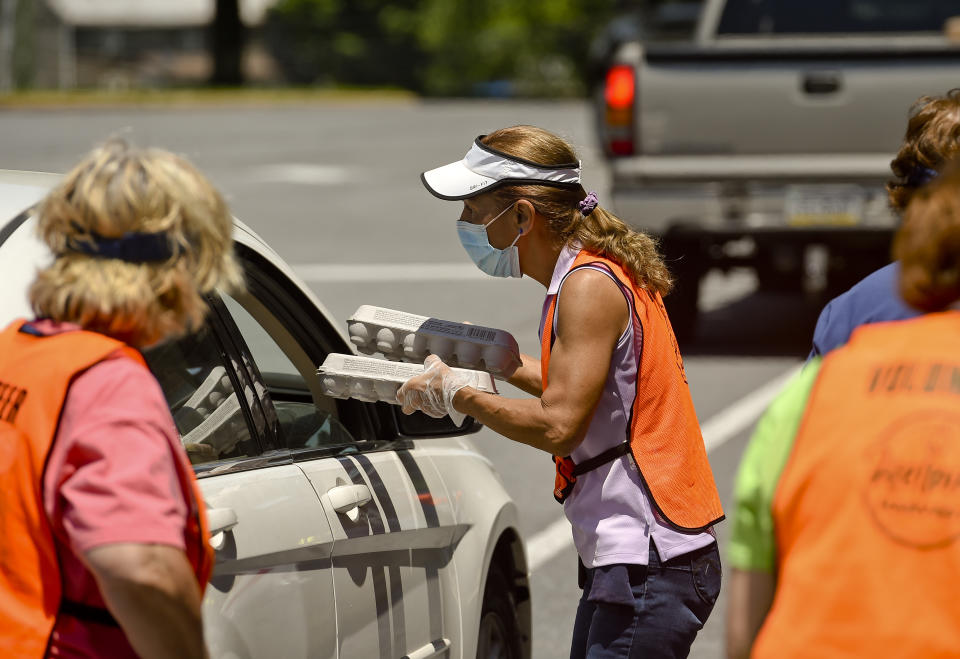US poverty declines at record pace despite millions of job losses — for now
The coronavirus pandemic prompted an unprecedented decline in economic activity, with millions of job losses hitting low-income households particularly hard. But during those challenging times, over 6 million Americans have been lifted out of poverty, thanks to increased government support.
The poverty rate declined by 2.6 percentage points from 10.9% in January and February before the pandemic started to 8.3% in April and May when millions of jobs were already lost due to the outbreak, according to a new paper by the Becker Friedman Institute at the University of Chicago. In the last 20 years, there’s been only one decline larger than 1 percentage point.
“It’s enormous for a month or two,” said Bruce Meyer, professor at the University of Chicago Harris School of Public Policy and co-author of the paper.

The decrease in poverty is driven by the government’s response to the pandemic and the distribution of stimulus checks and additional unemployment benefits under the CARES Act.
Read more: Unemployment insurance: What it is and how to get it
“These are unprecedented transfers from the government to household income,” said James Sullivan, professor at the University of Notre Dame and co-author of the paper. “Nearly $260 billion to households in the U.S. and the unemployment insurance program provided more than $140 billion in April and May.”
‘There's reason to be concerned that poverty might rise’
In addition to the declining poverty level, personal income was also up more than 10% in April and some Americans are getting closer to earning a living wage than before, but the supports that made this happen — mainly stimulus checks and unemployment benefits — were one-time or set to expire soon. That means all those gains may be lost.

“That's a sizable decline in poverty, but there's a lot of questions around whether it will persist,” Sullivan said. “More than all of it is driven by the government response, some of that which was temporary in the form of one-time payments, and the expansion of weekly unemployment insurance benefits expires at the end of July.”
Read more: What to do before you lose your job
Two in 3 Americans who got the additional $600 benefits under the CARES Act are now earning more than when employed, according to a recent paper from Becker Friedman Institute at the University of Chicago.
But If those benefits aren’t extended, the positive impact on people’s incomes will quickly disappear, according to Martha Gimbel, manager of economic research at Schmidt Futures.
“A lot of these benefits are set to expire,” Gimbel said. “It’s certainly likely that people's income plunges and that food insecurity and housing insecurity increases.”
And unless the labor market bounces back and the unemployment rate goes down substantially in the coming months, “there's reason to be concerned that poverty might rise,” according to Sullivan.
Read more: Coronavirus: How to apply for food stamps
“Many are projecting the unemployment rates to remain that high,” he said. “I wouldn't be surprised if poverty starts to rise as we move into the fall, and particularly in the winter.”
‘That doesn't necessarily have to mean that everybody's better off’
While personal income is up and the poverty rate is down, these measures may not be enough to gauge if people are more secure financially. Other indicators show many Americans in dire financial straits.
“We're finding increases in income, and that doesn't necessarily have to mean that everybody's better off,” Sullivan said. “There's been increased food insecurity and longer lines of food pantries.”

Applications for the Supplemental Nutrition Assistance Program (SNAP), the federal program formerly known as food stamps, have been skyrocketing since the start of the pandemic. Additionally, while personal income has gone up, spending has decreased in April, underlining that people are worried about an uncertain future, according to Sullivan.
“That might suggest that people don't feel better off, even though their incomes are higher,” he said. “People are anxious about uncertainty, about future income streams, and whether or not they'll have a job six months from now. People are worried about their health and they're worried about continuing life as they know.”
Denitsa is a writer for Yahoo Finance and Cashay, a new personal finance website. Follow her on Twitter @denitsa_tsekova.
Read more:
Rich Americans' pullback in spending is hurting the economic recovery
Read more personal finance information, news, and tips on Cashay
Follow Yahoo Finance on Twitter, Facebook, Instagram, Flipboard, SmartNews, LinkedIn, YouTube, and Reddit.

 money
money 

